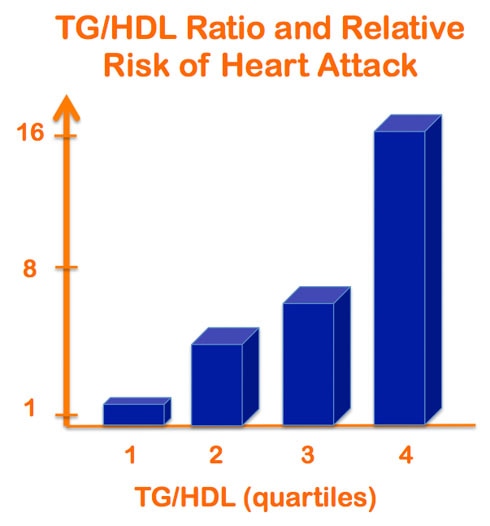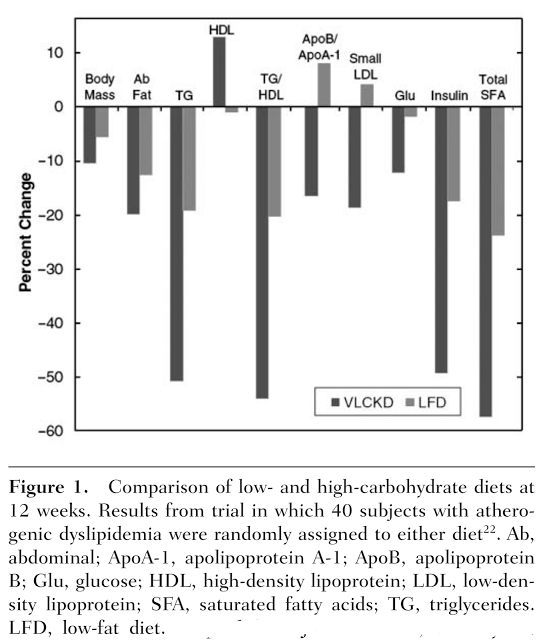|
One of the common responses that I encounter when I ask my patients about diet is that the ideal diet is essentially a low fat diet. What this means varies to some degree but often people characterize this "ideal diet" as consisting of low-fat yogurt, bread, cereal, fruit, and a lot of chicken. But is the high sugar, high meat, and low fat diet described above the ideal? Does it actually result in lower levels of fat in the blood? In my view the answer is clearly no. When I tell patients that the "ideal" diet they are consuming actually leads to higher levels of fat in their blood even though it is a low fat diet they are puzzled. The reasons for this are complex and beyond the scope of this article. Needless to say, Triglycerides and Serum Fatty Acids (SFA), which represent the majority of the fat that floats in our blood, tend to rise when patients have more insulin resistance and are eating a higher carbohydrate diet. The serum Triglycercide level is a component of the typical "lipid panel" or cholesterol panel. It is one of the most important numbers you should look at in your cholesterol panel. The higher the level of triglycerides in your blood especially when compared to your HDL ("good" cholesterol) level the higher your risk for heart disease. Ideally, the ratio of your triglycerides to your HDL should be less than 1. See the figure below. The strength of this correlation is much stronger than the correlation between you total cholesterol or LDL and your risk for cardiovascular disease. So what dietary intervention helps you lower the TG/HDL ratio, SFA level, Triglycerides, and abdominal fat the best? While this is not a completely settled issue, the vast majority of studies that I have reviewed show something similar to the figure below. The participants in the study below followed either a very low carbohydrate ketogenic diet (Low-carb/High fat diet) compared to a conventional low-fat (High-carb) diet. The results are interesting. The high fat diet dramatically lowered body mass, abdominal pain, triglycercides, TG/HDL, glucose, insulin, and total SFA compared to the conventional low-fat diet. This also means that the "ideal diet" may not be that ideal after all. I think it is pretty clear that our diet is one of the most crucial elements that we can control to ensure our health. However, I don't think there is an "ideal" diet for everyone. That is because what the "ideal" diet may be for one person may not be appropriate for another. Diet should be individualized and based on objective and subjective measures such as the measures I described above.
If you are looking to improve your health and diet and to get an individualized approach I am happy to help. Your doctor may also be able to help but in many cases my fellow doctors are not always familiar with dietary literature and may not be good guides. If you have health issues please consult with your physician before making any significant changes in your diet.
1 Comment
|
Doctor/Telemed/Sick Visit $60
PREMIUM $45-60/MO
WEIGHT LOSS $60 HCG DIET $399 HORMONE VISIT $60 BLOOD WORK $60 LACERATION $150 STEM CELL $999 Testosterone Visit $69 Vitamin B12 $25 Archives
June 2022
Categories
All
|



